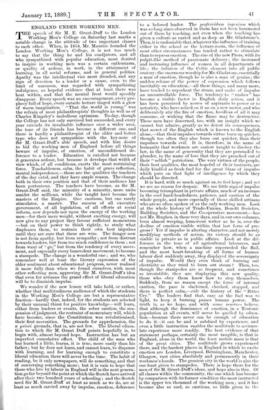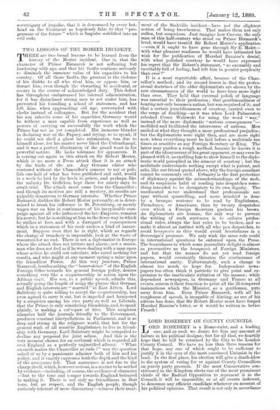ENGLAND UNDER WORKING MEN.
rspeech of Sir M. E. Grant-Duff to the London Working Men's College on Saturday last marks a notable change in the attitude of two important classes to each other. When, in 1854, Mr. Maurice founded the London Working Men's College, it is not too much to say that the thing he and his coadjutors, and all who sympathised with popular education, most desired to inspire in working men was a certain enthusiasm, or quality of ardour, in work, in the attainment of learning, in all social reforms, and in general politics. Apathy was the intellectual vice most dreaded, and any sign of devotion to a leader or a cause, even to the limit of unreason, was regarded with sympathising indulgence, as hopeful evidence that at least there was heat within, and that the mental frost would speedily disappear. Every speech was an encouragement, every pro- phecy full of hope, every outside lecture tinged with a glow of warm imagination. "That the world is young," was the refrain of most philanthropists' thoughts as well as of Charles Kingsley's melodious optimism. To-day, though the College has not only survived but succeeded, and every year extends its invaluable influence over a wider area, the tone of its friends has become a different one, and there is hardly a philanthropist of the older and better type who does not sympathise with the key-note of Sir M. Grant-Duff's able speech, and with him desire to bid the working men of England before all things beware of impulse, of emotion, of unconditioned de- ference to a leader. Education is extolled not because it generates ardour, but because it develops that width of view which, of all conditions, exerts the most restraining force. Teachableness, calm, the habit of grave reflection, mental independence,—these are the qualities the teachers of the day extol, and they have ample reason. The change both in their own position and that of their audience has been portentous. The teachers have become, as Sir M. Grant-Duff said, the minority of a minority, mere units amidst the millions, while the taught have become the masters of the Empire. One cautions, but one rarely stimulates, a master. The success of all executive government, of all legislation, of all efforts at social reform, now depends not upon the energy of the working men—for their mere weight, without exerting energy, will now give to any project they favour sufficient momentum —but on their power to think rightly, to study what displeases them, to restrain their own best impulses until they are sure that these are wise. The danger now is not from apathy, but from sympathy ; not from distrust towards leaders, but from too much confidence in them ; not from want of "go," but from the tendency of every move- ment, and especially every benevolent movement, to become a stampede. The change is a wonderful one ; and we, who remember well at least the literary expression of the older sentiment about educational progress, never realised it more fully than when we found ourselves, with most other reflecting men, approving Sir M. Grant-Duff's idea that even for artisans the grand effect of liberal education will be to diminish impulse.
We wonder if the new lesson will take hold, or rather, whether that multitudinous audience of which the students in the Working Men's College are but a representative fraction—hardly that, indeed, for the students are selected by their unusual thirst for positive knowledge will learn, either from leaders or events, the sober caution, the sus- pension of judgment, the restraint of momentary will, which have become, since the Constitution was revolutionised, their first necessities. The grounds for apprehension, the a priori grounds, that is, are not few. The liberal educa- tion to which Sir M. Grant Duff points hopefully is, to begin with, almost beyond hope. Instruction has but an imperfect cumulative effect. The child of the man who has learned a little, learns, it is true, more easily than his father ; but he does not learn, and cannot learn, to dispense with learning, and for learning enough to constitute a liberal education there will never be the time. The habit of reading, be it only newspapers, will do something, and that of conversing something more ; but it is vain to hope that those who live by labour in England will in the next genera- tion go far beyond the point at which the Scotch have arrived after their two hundred years of schooling ; and the Scotch need Sir M. Grant-Duff at least as much as we do, are at least as much carried away by impulse, emotion, deference to a beloved leader. The perferridum ingenium which was so long since observed in them has not been hammered out of them by teaching, not even when the teaching has given a culture as varied and as deep as Mr. Gladstone's. Then, it is undeniable that, whatever the influence of training either in the school or the lecture-room, the influence of most other circumstances has tended rather to stimulate than to repress emotion. The rise of the new Press, with its pulpit-like method of passionate delivery ; the increased and increasing influence of women in all departments of life ; the infusion of the Celtic element into all public oratory; the enormous worship for Mr. Gladstone, essentially a man of emotion, though he is also a man of genius ; the sudden release of the power of expression which follows inevitably on education,—all these things, and many more, have tended to superheat the steam, and make of impulse an uncontrollable force. The tendency to " rushes " has become a visible factor in English daily action, and it has been perceived by scores of aspirants to power or to notoriety, who have seized on it as on a new motor, and who deliberately stir the fire of emotion, heedless of all it may consume, or wishing that the flame may be destructive. These men have discerned, too, with an insight which we cannot but admire, greatly as we detest its consequences, that secret of the English which is known to the English alone,—that their impulses towards virtue burn up quicker, though too often they also burn out quicker, than their impulses towards evil. It is, therefore, in the name of humanity that workmen are easiest taught to disobey the law, in the name of generosity that they are persuaded to plunder, in the name of love that they are preached out of their " selfish " patriotism. The very virtues of the people, their best qualities, the most hopeful of their instincts, are daily kindled as fresh fuel for the great blaze of impulse which puts on that light of intelligence by which they should be directed.
It is hard, with so much against us, to feel hope ; and yet we see no reason for despair. We see little sign of impulse becoming triumphant in private affairs, much of an increase in the cool hard-headedness, patience, and caution of the whole people, and more especially of those skilled artisans who are so often spoken of as the only working men. Look at the whole history'of Trade-Unions, Benefit Societies, Building Societies, and the Co-operative movement,—has not Mr. Hughes, in these very days, and in our own columns, been almost weeping, humorous writer as he is, over the decline of emotion visible within that last form of pro- gress? Yet if impulse is altering character, and not merely modifying methods of action, its victory should be as visible in private as in public affairs. Look at the dif- ference in the tone of all agricultural labourers, and remember how, when a machine superseded the flail, and the most heart-breaking of all forms of human labour died suddenly away, they displayed the sovereignty of impulse. Would they even think of burning out electricity as they tried to burn out steam ? Then, too, though the stampedes are so frequent, and sometimes so irresistible, they are displaying this new quality, those who obey them know how to stop themselves. Suddenly, from no reason except the force of internal caution, the pace is slackened, checked, stopped, and there is perfect calm,—vide the history of the "Bitter Cry." The leaders find that, easy as the fuel was to light, to keep it burning passes human power. The truth is, as we hope, and with some reserves believe, that although the dominance of emotion, in a Teutonic population at all events, will never be quelled by educa- tion—because there never can be enough of education to do it—it can be and is subdued by experience, and even a little instruction enables the multitude to accumu- late experience more readily. The best evidence of that statement perhaps, certainly the most tangible, is that in England, alone in the world, the least mobile mass is that of the great cities. The multitude grows experienced there, and the hardest places in England in which to excite emotion are London, Liverpool, Birmingham, Manchester, Glasgow, vast cities absolutely and permanently in their workmen's hands. The greatest city in the world is also the one least given to stampedes. There is hope there for the men of Sir M. Grant-Duff's ideas, and hope also in this. Of all classes within the community, the one which has become by comparison with its former condition the most instructed is the upper ten thousand of the working men ; and it has become also so cool, so cautious, so little given to the sovereignty of impulse, that it is denounced by every hot- head on the Continent as hopelessly false to that "pro- gramme of the future" which is Impulse -solidified into an evil cede.







































 Previous page
Previous page